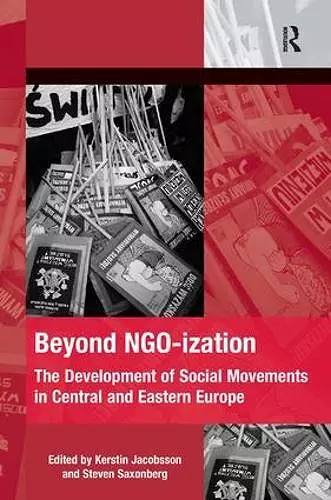Beyond NGO-ization
The Development of Social Movements in Central and Eastern Europe
Kerstin Jacobsson editor Steven Saxonberg editor
Format:Hardback
Publisher:Taylor & Francis Ltd
Published:10th May '13
Currently unavailable, and unfortunately no date known when it will be back
This hardback is available in another edition too:
- Paperback£51.99(9781138279650)

The celebrations marking the 20th anniversary of the fall of the Berlin Wall provoked a debate on the outcomes of the transition process in the post-communist countries, including a debate on the functioning of civil society. This provided a good opportunity for researchers to collect new data and revise the discourse on collective action and the dynamics of civil society in these countries. Jacobsson and Saxonberg's collection of essays looks at social movements, and their forms of mobilization and organization, as well as action repertoires in relation to the social context, and their success or failure. The book meets an important need in the discourse on post-communist social movements by going beyond the usual discourse about the weak and non-participatory civil society in the post-communist context. This book gives a nuanced and updated view of social movements in post-communist Europe, by looking at the cases of relatively successful mobilization, by examining groups that have often been neglected in the discourse on social movements and civil society (including animal-rights groups, racist movements and non-feminist family organizations), and by giving a deeper analysis of the different strategies that civil society organizations and groups can use. Rather than expecting social movements in post-communist Europe to follow the same patterns and operate in the same fashion as in Western Europe, this volume shows that a wider view of contentious action is needed in order to understand the variety of strategies employed by collective actors operating in this context.
"This fine collection provides a differentiated and nuanced picture of social movements in post-communist Central and Eastern Europe, convincingly stressing the great variation in their goals, structures, and strategies that can only be understood when taking into account their specific contexts. It offers rich insights into recent processes of political mobilization in post-communist societies and provides strong arguments for embedding the study of social movements into a broader look at civil society and the role of the state."―Dieter Rucht, Social Science Research Center Berlin, Germany
"Using case studies from several post-communist European countries, this fascinating anthology updates our understanding of the functioning of civil society organizations. The eclectic collection challenges the reader to think differently about social movements, focusing on the impact of differing political contexts, organizational structures, and types and levels of funding on the legitimacy, scope, strategies, and viability of post-communist NGOs."―Alena Heitlinger, Trent University, Ontario, Canada
"The book rigorously integrates theoretical approaches with empirical evidence drawn predominantly from case studies. It also deliberately broadens the groups analyzed, capturing under-investigated social issues related to gay rights, animal rights, environmental movements, conservative women, mothers, and family organizations, in addition to anti-immigration xenophobic movements and the Color Revolutions... the present volume introduces a novel approach to social movements in the CEE that goes beyond the common NGO-ization diagnosis, marking a turn in the study of social activism in the region, while calling for further, particularly comparative, research."―Council for European Studies - Reviews and Critical Commentary
"The volume brings together significant new and updated research on social movements in post-communist European societies... the volume offers a timely re-thinking of social movements in the CEE region and the findings bring relevant critique to many of the dichotomies that flourish in the social movement literature more generally."―Acta Sociologica
"Anthropologists concerned with social movements may find useful examples within these chapters, but anyone researching in CEE will find that this volume provides new insight on the changing nature of the relationship between states and political subjects following the collapse of state socialism in the region."―Anthropology of East Europe Review
"This book gives a nuanced and updated view of social movements in post-communist Europe, by looking at the cases of relatively successful mobilization, by examining groups that have often been neglected in the discourse on social movements and civil society (including animal-rights groups, racist movements and non-feminist family organizations), and by giving a deeper analysis of the different strategies that civil society organizations and groups can use. The collection of studies and reports is very useful and even crucial for understanding the specifics of social activism in Eastern Europe. The book is well structured and presents a diversity of approaches, which is a huge advantage of the NGOs in Central and Eastern Europe."―Polish-studies.Interdisciplinary (Pol-Int)
"This edited volume brings together scholars interested in social movements, political participation, and civil society in Eastern Europe. The book’s overarching objective is to situate Eastern European social movement mobilization, which takes place in particular institutional, normative, and cultural contexts, within existing theoretical frameworks... Beyond NGO-ization raises important empirical and theoretical questions about the ways in which scholars and activists understand movement emergence and dynamics and is an important contribution for students and scholars of political sociology and social movements."―David Pettinicchio, University of Oxford
"A strength of Beyond NGO-ization is that its core analytical themes, expertly argued by the editors (NGO-ization, civil society weakness/strength, and communist legacies), consistently frame each empirical study, while the chapter authors skillfully engage with distinct social movement research streams that focus on framing (e.g., adapting to the discourse of neoliberalism), political opportunity structures (e.g., elections and policy mechanisms), and resource mobilization (e.g., tax donations and cultural resources). Therefore, the volume will be stimulating reading even for students of social movements without an interest in Eastern Europe... This book, one of the finest editorial products, will be of particular appeal to students of nonprofits, social movements, and social change."―Erzsébet Fazekas, University at Albany, SUNY, Contemporary Sociology: A Journal of Reviews
ISBN: 9781409442226
Dimensions: unknown
Weight: 657g
280 pages